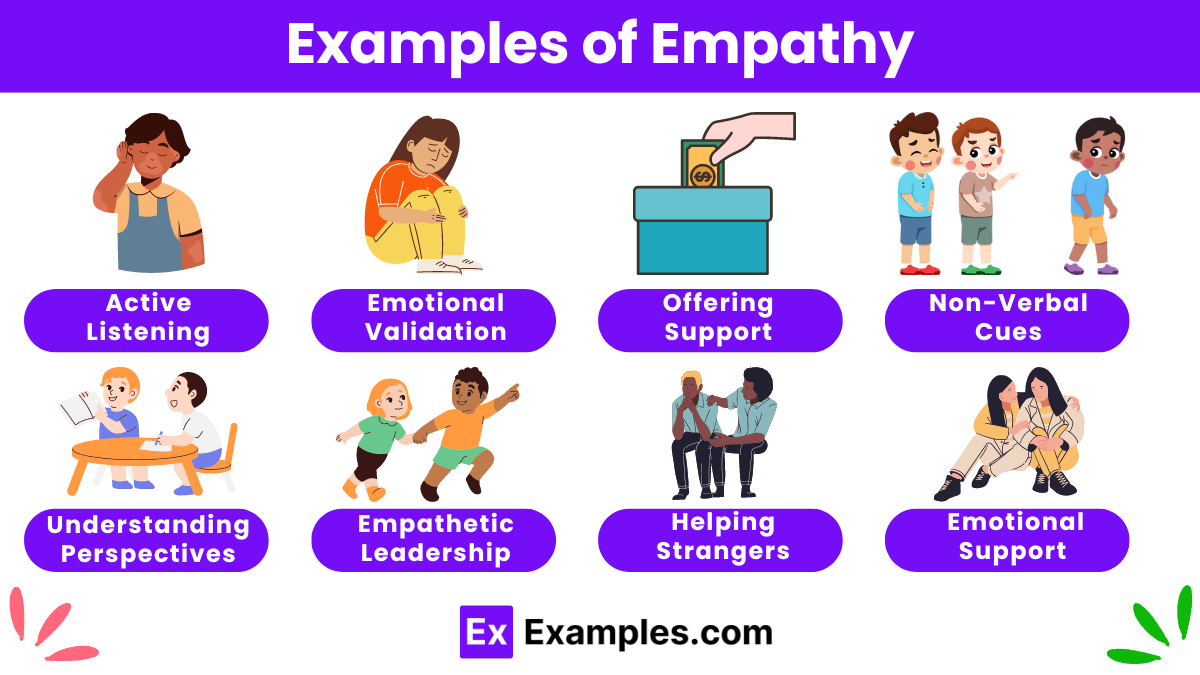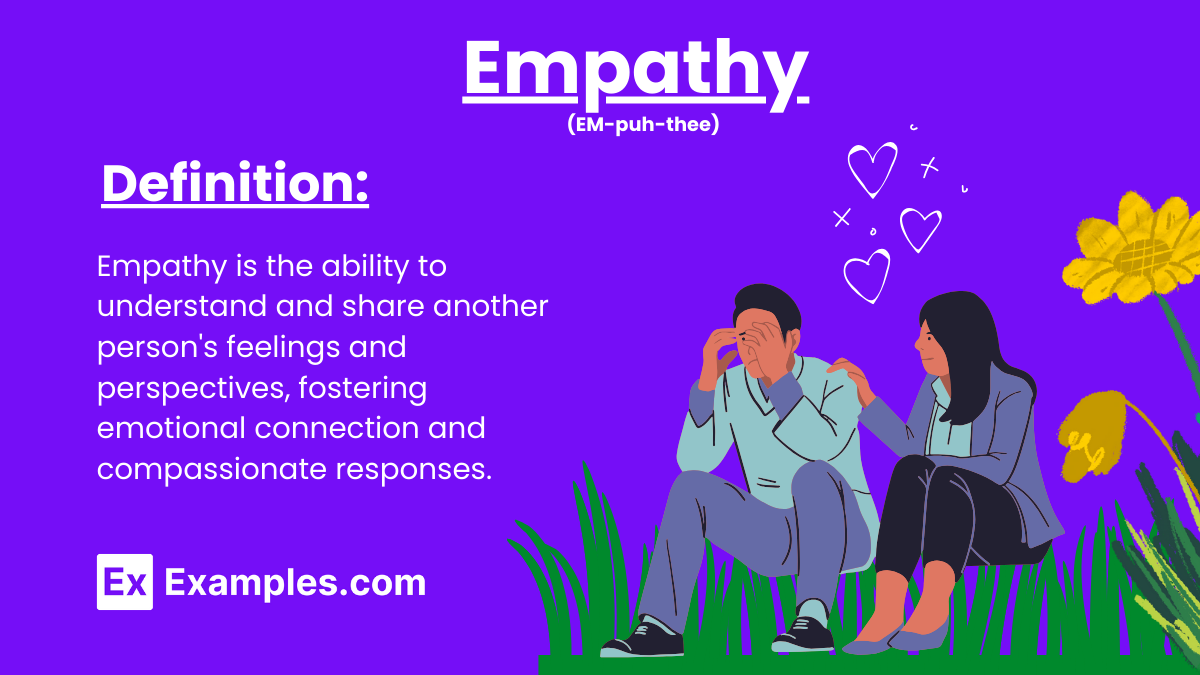Empathy
Empathy is the ability to understand and share the feelings of others, fostering deeper connections. Empathetic communication enhances relationships by allowing us to respond compassionately and thoughtfully. Practicing empathy involves active listening, recognizing emotions, and responding with care. It is crucial in both personal and professional interactions, promoting trust and mutual respect. Empathy not only improves communication but also creates a supportive environment where everyone feels valued and understood.
What Is Empathy?
Empathy is the ability to understand and share another person’s feelings and perspectives. It involves recognizing emotions in others, feeling compassion, and responding with care and understanding, enhancing interpersonal relationships and fostering a supportive, empathetic communication environment.
Examples of Empathy

- Active Listening: During a conversation, paying full attention to the speaker, nodding, and providing verbal affirmations like “I understand” shows empathy.
- Emotional Validation: When a friend expresses sadness, saying, “I can see you’re really upset, and it’s okay to feel this way,” validates their emotions.
- Offering Support: When a colleague is overwhelmed, offering to help with tasks or simply being there to listen demonstrates empathetic support.
- Personal Experience Sharing: Sharing a similar experience to show understanding, like saying, “I went through something similar and it’s really tough.”
- Non-Verbal Cues: Showing empathy through body language, such as maintaining eye contact, nodding, and mirroring the speaker’s emotions.
- Compassionate Feedback: Providing constructive criticism in a supportive manner, for example, “I noticed you were struggling with the project. How can I help?”
- Understanding Perspectives: Trying to see situations from another person’s viewpoint, such as considering a teammate’s ideas during a discussion.
- Empathetic Leadership: A manager noticing an employee’s stress and offering flexible working hours or additional support.
- Helping Strangers: Offering assistance to someone in need, like helping an elderly person carry groceries or giving directions to a lost tourist.
- Emotional Support in Difficult Times: Being there for someone who has experienced a loss, saying, “I’m here for you, and you don’t have to go through this alone.”
Types of Empathy
- Cognitive Empathy: Understanding another person’s thoughts and perspectives. It involves seeing things from their point of view and comprehending their mental state.
- Emotional Empathy: Sharing and feeling another person’s emotions. This type of empathy allows one to resonate with the emotions of others, experiencing their feelings as if they were one’s own.
- Compassionate Empathy: Going beyond understanding and sharing feelings, this involves taking action to help someone in distress. It’s a combination of cognitive and emotional empathy, motivating supportive behavior.
- Somatic Empathy: Physically sensing another person’s emotions or experiences. This involves feeling physical reactions, such as tension or relaxation, in response to someone else’s emotions.
- Affective Empathy: Responding emotionally to another person’s emotional state. This type of empathy is about feeling a direct emotional response that matches the other person’s emotions.
- Spiritual Empathy: Connecting with another person’s spiritual beliefs or experiences. This involves understanding and resonating with their sense of purpose, values, and spiritual journey.
Importance of Empathy
- Enhances Relationships: Empathy and apology in crisis communication build trust and understanding, fostering deeper connections in personal and professional relationships..
- Improves Communication: By understanding others’ emotions and perspectives, empathetic communication reduces misunderstandings and promotes clearer, more effective interactions.
- Resolves Conflicts: Empathy helps in addressing the emotional needs and concerns of all parties, leading to more constructive and amicable conflict resolution.
- Supports Mental Health: Providing empathetic support to those struggling with mental health issues can alleviate feelings of isolation and promote emotional well-being.
- Promotes Compassionate Leadership: Empathetic leaders are more attuned to their team’s needs, leading to a more supportive and productive work environment.
- Encourages Inclusivity: Understanding and valuing diverse perspectives through empathy fosters an inclusive and respectful environment.
- Enhances Emotional Intelligence: Empathy is a core component of emotional intelligence, enabling better self-awareness and interpersonal skills.
- Drives Social Change: Empathy motivates individuals to act on social injustices, contributing to a more compassionate and equitable society.
- Improves Customer Service: Empathetic interactions in customer service lead to higher satisfaction and stronger customer relationships.
- Facilitates Education: Teachers who practice empathy can better understand and address their students’ needs, improving learning outcomes and student engagement.
Potential Pitfalls of Empathy
- Emotional Burnout: Excessive empathy can lead to exhaustion and stress from taking on others’ emotions.
- Biased Decision-Making: Empathy in communication skills might cloud judgment, leading to favoritism or unfair treatment.
- Manipulation: People can exploit empathetic individuals for personal gain or to influence their actions.
- Loss of Objectivity: Strong empathetic responses may impair objective thinking and problem-solving.
- Self-Neglect: Prioritizing others’ emotions can cause individuals to ignore their own needs and well-being.
- Emotional Contagion: High empathy can result in absorbing others’ negative emotions, affecting one’s mental health.
Barriers to Empathy
- Lack of Awareness: Not recognizing or understanding others’ emotions, as highlighted in an empathy map, can hinder empathetic responses.
- Cultural Differences: Variations in cultural norms and values can create misunderstandings and reduce empathy.
- Personal Biases: Prejudices and stereotypes can obstruct the ability to empathize with certain groups or individuals.
- Emotional Overload: Excessive exposure to others’ suffering can lead to desensitization and empathy fatigue.
- Self-Focus: Being overly concerned with one’s own problems can limit the capacity to empathize with others.
- Poor Communication Skills: Inability to effectively express or interpret emotions can create barriers to empathy.
Uses of Empathy
- Improving Communication: Empathy in assertive communication enhances understanding and reduces misunderstandings by allowing individuals to fully grasp each other’s perspectives.
- Building Relationships: Empathy fosters deeper connections and trust in personal and professional relationships, creating a supportive environment.
- Conflict Resolution: Understanding and addressing the emotions and perspectives of all parties involved helps resolve conflicts more effectively.
- Enhancing Emotional Intelligence: Empathy is a key component of emotional intelligence, aiding in recognizing and managing one’s own emotions and those of others.
- Promoting Compassionate Leadership: Leaders who use empathy can better understand their team’s needs, leading to more effective and compassionate management.
- Supporting Mental Health: Empathy helps provide emotional support to those struggling with mental health issues, making them feel understood and less isolated.
- Encouraging Inclusivity: Empathy promotes a more inclusive environment by understanding and valuing diverse perspectives and experiences.
- Facilitating Education: Teachers who practice empathy can better understand their students’ needs and learning styles, improving educational outcomes.
Causes of Empathy
- Genetic Factors: Some people have a natural predisposition for empathy due to genetic influences.
- Early Childhood Experiences: Positive interactions with caregivers and role models can cultivate empathy.
- Socialization: Cultural and societal norms that promote caring and understanding foster empathetic behavior.
- Emotional Intelligence: High emotional intelligence enhances the ability to recognize and respond to others’ emotions.
- Personal Experiences: Experiencing hardship or joy can enhance empathetic communication, fostering deeper connections with others in similar situations.
- Education and Awareness: Learning about empathy and its importance can encourage empathetic behavior.
Signs of Empathy
- Active Listening: Empathetic listening in assertive communication involves paying full attention and showing interest in what others are saying.
- Understanding Emotions: Recognizing and accurately interpreting others’ emotional states.
- Compassionate Responses: Offering support, comfort, and understanding to those in distress.
- Non-Judgmental Attitude: Accepting others’ feelings and perspectives without criticism or bias.
- Perspective-Taking: Putting oneself in someone else’s shoes to understand their point of view.
- Emotional Resonance: Feeling a shared emotional experience with someone else.
Empathy vs Sympathy
| Aspect | Empathy | Sympathy |
|---|---|---|
| Definition | Understanding and sharing another’s feelings | Feeling pity or sorrow for someone else’s pain |
| Emotional Involvement | Deep emotional connection | More detached and less involved emotionally |
| Perspective-Taking | Putting oneself in another’s shoes | Observing someone else’s situation |
| Response | Providing support and understanding | Offering condolences or comfort |
| Impact on Relationships | Strengthens bonds and connections | Can sometimes create distance |
| Outcome | Facilitates mutual understanding and trust | May lead to feelings of being pitied |
Tips for Practicing Empathy
- Active Listening: Focus completely on the speaker, avoid interrupting, and show genuine interest in their words.
- Ask Questions: Encourage others to share more about their feelings and experiences to gain a deeper understanding.
- Be Present: Show that you are fully engaged in the moment with the person you are interacting with.
- Avoid Judgments: Suspend personal biases and refrain from making judgments about others’ feelings or situations.
- Reflect Back: Paraphrase what the person has said to show that you are listening and to clarify understanding.
- Show Compassion: Express concern and care through your words and actions, offering support where needed.
Why is empathy important?
It fosters better relationships and improves communication by helping people connect on an emotional level.
Can empathy be learned?
Yes, empathy can be developed through practice and active listening.
What are the types of empathy?
Cognitive, emotional, and compassionate empathy are the three main types.
What is cognitive empathy?
Understanding another person’s perspective or mental state.
What is emotional empathy?
Feeling the emotions that another person is experiencing.
What is compassionate empathy?
Not only understanding and feeling another’s emotions but also taking action to help.
How does empathy differ from sympathy?
Empathy involves understanding and sharing feelings, while sympathy involves feeling pity for someone’s hardships.
Why is empathy important in the workplace?
It improves teamwork, reduces conflict, and enhances leadership effectiveness.
How can I practice empathy?
By actively listening, asking open-ended questions, and reflecting on others’ perspectives.
What are the benefits of empathy?
Stronger relationships, better conflict resolution, and increased emotional intelligence.



